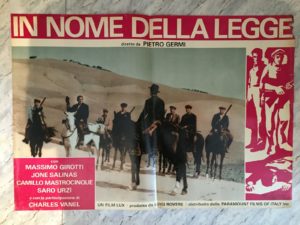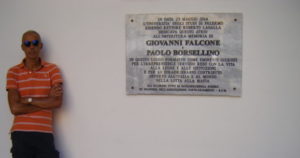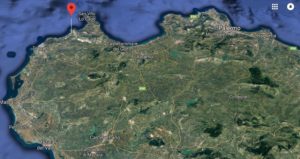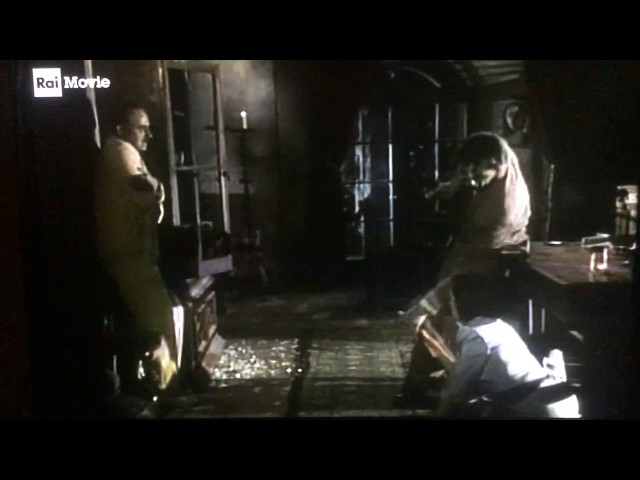You’ll see no Rome, Florence, Venice or Taormina in this diary. Instead, I’ll take you to small unknown places of rare beauty often harbouring next to territorial or industrial diseases, ‘ugliness’ of various kinds that makes Italy the cradle of the best and the worst. I was taken to these places in the long hot Italian summer by chance or simply by getting lost, always the best way to travel for the non-holiday-package’ traveller.
This is not an itinerary, a tourist guide or a suggested tour. I just happen to be in those places and I want to share my sensations and the ideas they evoked in me with you. To make you feel these spots the way I felt them. Even in the frenzy of XXI century life, this is an attempt to recollect emotions in tranquillity through my inward eye.
San Vito Lo Capo, in the name of the law? (July 2016)
There you feel free. I have just swum the 300 meters that limit the swimming area and I turn back to look inland. The water below me is incredibly azure and clear. I can see fish swimming next to me and, further down, shells lying on the white sandy bottom. The water is warm on my skin and standing still or floating to watch the landscape is a pleasure. The crescent-shaped beach is crowded with sun umbrellas dancing in the breeze like daffodils. Behind the palm trees that border the promenade, small one-story white houses with flat roofs form the seaside village of San Vito. In the distance, against a blue sky without a single cloud, Monument Valley-like peaks circle the village. I am waiting for horse-riding Indians to appear against the skyline: this is pure Sergio Leone and I wonder why he used to go to Southern Spain to shoot his spaghetti westerns. As I swim back, I start seeing real life again. On the beach people are lying in the sun or eating and sleeping under umbrellas. Behind the beach, bars and restaurants are filled with customers having lunch under the shady verandas. Mediterranean food here is the best and the cheapest. In my mouth I can still taste the fish dinner we had last night. The seafood was bought fresh at Trapani fish market, put on the grill and that was it. Nothing more is needed when food tastes like this, an experience of exquisiteness one won’t easily forget. The vision of a long line of people sitting on the benches of the Hasting’s promenade in the U.K. eating battered fish and vinegar chips on a cloudy and windy summer’s day crosses my mind but vanishes after a while.
Life is easy and filled with pleasure down here at the very end of Europe as far as basic needs are concerned. Where is the mafia, I think to myself as I swim back, where is all the poverty, where are the migrants that land from nearby Africa every day? This cloak of beauty hides them, and, blinded by the sun, we don’t see them. But we all know that the Mafia is there for sure when you don’t see it. The roaring ‘second mafia war’ of the 80s and the mafia-state war of the 90s (before the shameful mafia-state negotiations) are over now; the less you shoot the better, all is quiet now and the local feudal mafioso lord is probably watching us now from his mansion, known and respected by locals. It is hard for me to imagine that the local businesses have to pay taxes to the State – in these tourist areas receipts cannot be avoided, differently from other rural nearby areas – and the pizzo to the mafia as well. They give you protection, or else they burn your enterprise, send you bullets by mail or kidnap your sons while local politics and the police turn the other way. If your car is stolen around here, you don’t go to the police, you go to the local picciotti. They’ll find your car, but in so doing ‘they’ have a credit with you that can last forever. If they steal your car, the best advice I was given here is to buy another one. Unwritten rules are those which count, official ones are made to be avoided. The State in the Deep South has been absent too long and is still felt like an enemy, while the mafia offers you protection and security… besides, they are fervent Christians.
Next to my towel on the beach is John Dickie’s Mafia Republic. Italy’s Criminal Curse, a true crime book which a wise traveller should bring with him on an Italian holiday, as I write in my review. As I was researching for my volume Silvio Berlusconi’s Italy: A Portrait of the Country and its Godfather, I stumbled upon this thick work. I had almost involuntarily been dragged into the criminal dark side of Italy since writing about the last twenty years of Italian public life – the Berlusconi Age – meant writing about the permanent mafia-state connections. Dickie’s book and the surrounding landscape reminded me of Italy’s first mafia film, In the Name of the Law, directed by Pietro Germi in 1949, a strange aesthetic mixture of Neorealism and Western. Germi’s Sicily is Tombstone with Mediterranean embellishments, a place where a lone lawman faces his criminal foes. But, in this pre-spaghetti western, the final showdown between the lawman and the criminals does not take place: in an unusual happy end, they almost shake hands. Mafiosi are not criminals, they are an auxiliary police force: this is the movie’s shocking bottom line. “In the Name of the Law may have been a cinematographic fantasy, but it nonetheless glorified a very real deal between the mafia and the state in the founding years of the Italian Republic”, Dickie writes. In fact, in those post-war years, mafiosi were slaughtering bandits who had become politically inconvenient or cutting down peasant militants who refused to understand the way things worked in Sicily, helping to preserve the political status quo. Isn’t it like this today as well? I wonder. Little doubt is left after the first sentence of the so-called ‘state-mafia negotiations’ trial in April 2018: the sentence confirmed that the ‘second republic’ of the early nineties was born thanks to a deadly deal between the bloodthirsty Corleonesi and the newly established first Berlusconi government, not exactly in the name of the law.
Cormino
The beach bar I am sitting in looks like an improvised cabin. A strong hot dry scirocco makes it shake dangerously and sharpens the colours of the sand, the sea, the sky and the rocky mountains that embrace the bay. The sea is calm, incredibly clear, green and blue. The big heat of the inland areas stops by the sea, the barman is telling me, the water cools off the scirocco and so the temperature remains in the low thirties Celsius. An hour of snorkelling has just shown me sea life as if I was in an aquarium. The clearest waters in the Mediterranean are supposed to be in Sardinia, but here, in Cormino Bay, it is difficult to imagine something better than this. I even doubt that the famous Blue Lagoon waters of Comino, Malta, are clearer. It is a Saturday in late July and the beach is crowded with local people. Cormino is a popular destination, the opposite of Taormina, the main VIP destination in Sicily. In this land of extensive artistic beauty and villages falling to pieces, Cormino stands in between. The lungomare is basic, most of the one-story white houses behind the beach, the majority of them illegally built, need to be redesigned. In the little piazza in the village centre a naive all-in-one bar, tavola calda, restaurant and bazaar is the only open facility, grilling fresh fish and making espresso ristretto all day long.
The first thing stranger eyes notice are the people on the beach. They seem to have come out straight from a Pasolini or Antonioni film. Their age is difficult to guess but, in general, you are taken back a couple of generations at least: they all seem to belong to the period of neo-realism of cinecittà. They remind me of the stories a friend from Catania told me many years ago, during a visit to his hometown. He described life in the nearby village of Canicattini, taken as an iconic location of traditional Sicilian life. Male members of the family used to eat in a separate dining room, never stood up during meals, women were not admitted in their conversation, let alone exit home without wearing long black nun-like dresses. Female adultery was punished inside the house with physical violence. Male adultery had to be accepted, the wife pretending not to know what everybody else knew in the community. The cult of the Virgin Mary, and in general Christian devotion, was an unquestionable dogma. And the mafia was a natural element, existing like the sun and the sea.
The first thing that catches your eye is that these people are fat. No matter their age, men have balloon-shaped bellies and women are not only formose, but decidedly overweight. Apparently, the thing is strange. After all, this is the land of the healthy Mediterranean diet. Fish, pasta, vegetables, fruit, olive oil are everywhere, fresh, delicious and cheap. What we have to take into account is the two-generation-behind factor. After the great historical famine of the poorest land in Italy, the affluent society that landed down here some decades later has brought relative welfare, and the great starvation has been replaced by unnatural food consumption, as a kind of compensation. In the ‘civilized’ North of the country, overeating has been replaced by diet, veganism and gym addiction. Down here ‘fat’ is still ‘beautiful’ and overweight children are considered healthy. Being plump suggests you are a family of means, and you show it with pride. The most shocking experience of this kind happened to me two years ago, during a summer vacation in Cilento, a little-known but splendid coastal area south of the renowned Costiera Amalfitana. The area was filled with local tourism and overweight families met on the beach showing off their overflowing features and screaming most of the time, a traditional Southern Italian attitude particularly evident in Campania. In its capital Naples, I discovered some years ago during a stay on the island of Ischia, that children are the most obese in the country, having given up playing in the street for computer games and spaghetti and fish for American junk food. I still clearly remember the feeling of sadness I felt and the Shakespearian quote that flashed in my mind: ‘there is no darkness but ignorance’.
Notwithstanding the clarity of the scene, I have a creeping feeling of uneasiness, as if something dark was hiding behind this shining atmosphere. The idea is that, as a stranger unaware of local strength relationships, you might stumble into the wrong guy and a banal incident might turn into mayhem. Because here too privileges are untouchable, the feudal structure immobile, from the local boss down to his picciotti, anxious to show their untouchability, their pride, their misplaced superiority and, last but not least, their ferocity: belonging to Cosa Nostra has its strict rules, of course, and also its attitudes. A discussion for a parking space, a seat at the bar or a shady place under an umbrella may pull the trigger and develop a public show-off of superiority, just to remind the people around who is who.
The wind on my skin brings me back to reality. I temporarily drop my recollections and decide to have another short swim. Here, again, I feel free, surrounded by the mighty Monte Cofano you see in the picture, another extension of the Monument Valley by the sea.







